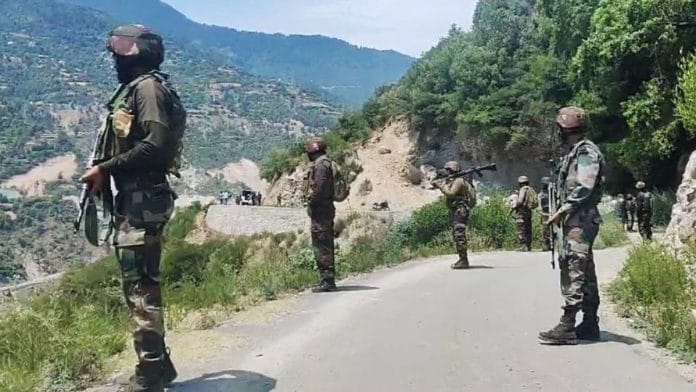Thank you dear subscribers, we are overwhelmed with your response.
Your Turn is a unique section from ThePrint featuring points of view from its subscribers. If you are a subscriber, have a point of view, please send it to us. If not, do subscribe here: https://theprint.in/subscribe/
Pakistan’s involvement in the Kashmir dispute has been complex, often oscillating between political maneuvering, diplomatic efforts, and military confrontations. Over the years, Pakistan’s role has been criticized for various reasons, including accusations of betraying the Kashmiri cause for political and strategic gains.
Kashmir was given the option to join either India or Pakistan or opt for independence after the partition. Its Hindu Maharaja, Hari Singh, chose a conditional accession to India in exchange for military assistance to fend off invading tribal militias supported by Pakistan. This led to the first Indo-Pakistani war in 1947-48, ending in a UN-mediated ceasefire. The region was split, with India controlling about 55% of Kashmir (Jammu & Kashmir) and Pakistan controlling roughly 30% (referred to as Azad Jammu and Kashmir and Gilgit-Baltistan). The remaining 15% lies with China, following the Sino-Indian war in 1962.
Pakistan launched a military operation called “Operation Gibraltar” in 1965, intending to ignite an insurgency in Indian-administered Kashmir. However, the operation failed, leading to a full-scale war between India and Pakistan. This culminated in the Tashkent Agreement of 1966, brokered by the Soviet Union. The agreement required both countries to withdraw to pre-war positions but made no explicit mention of resolving the Kashmir issue. The fact that the government of Pakistan did not push harder for a formal resolution of the Kashmir conflict during these negotiations was seen as a missed opportunity.
After the 1971 war, which resulted in the creation of Bangladesh and another military defeat for Pakistan, the Shimla Agreement was signed between India and Pakistan in 1972. Under this agreement, both countries agreed to resolve all disputes, including Kashmir, bilaterally. It was viewed by many Kashmiris as a betrayal because it effectively nullified international mediation, limiting Kashmir’s dispute to a bilateral framework.
The Kargil War of 1999, initiated by Pakistan’s military under General Pervez Musharraf, aimed to internationalize the Kashmir issue by infiltrating militants into Indian territory. However, when India launched a full-scale military response, Pakistan faced immense international pressure, particularly from the U.S. The war ended with Pakistan’s retreat, following Prime Minister Nawaz Sharif’s meeting with U.S. President Bill Clinton. The Kargil conflict was seen as another diplomatic failure, with Pakistan forced to withdraw without securing any tangible gains on the Kashmir front.
Following the September 11, 2001, attacks, Pakistan’s role in the Kashmir conflict underwent a significant shift. Under pressure from the U.S. to support the War on Terror, Pakistan was compelled to clamp down on militant groups operating in Kashmir. This move was seen by many Kashmiris as a betrayal, as it undermined the militancy in Indian-administered Kashmir. Pakistan’s decision to prioritize its relationship with the U.S. over its support for the Kashmiri cause was viewed as morally compromising stance.
In the mid-2000s, President Musharraf proposed a four-point formula to resolve the Kashmir conflict. This included demilitarization, self-governance, and joint management of the region by India and Pakistan. While this initiative was initially welcomed by some as a bold step towards peace, it was rejected by many Kashmiris who viewed it as a betrayal of their demand for self-determination. The lack of focus on a plebiscite, as outlined in the UN resolutions, and the shift towards a compromise solution were seen as Pakistan abandoning its traditional stance on Kashmir.
In August 2019, India revoked Article 370 of its Constitution, which granted special autonomy to Jammu & Kashmir. Pakistan’s response was largely diplomatic, with little tangible action to counter India’s move. Pakistan tried to raise the issue at the UN and other international forums, but the global response was lukewarm. Despite Pakistan’s claims that it would take the matter to the International Court of Justice, no substantial legal or diplomatic measures were taken. Many in Kashmir saw this as a betrayal of the Kashmiri cause, accusing the Pakistan of inaction in the face of India’s unilateral actions.
Pakistan’s economic dependence on countries like China and Saudi Arabia has also led to strategic compromises on the Kashmir issue. China, despite being an ally, has maintained a neutral stance on Kashmir, focusing on its interests in Gilgit-Baltistan for the China-Pakistan Economic Corridor (CPEC). Similarly, Saudi Arabia has not openly supported Pakistan’s stance on Kashmir, particularly after 2019. Pakistan’s inability to mobilize strong diplomatic support from its key allies is seen as another instance of betrayal.
The history of the Kashmir dispute is marked by a series of diplomatic, military, and strategic failures on Pakistan’s part. From the Tashkent and Shimla agreements to the handling of the Kargil War and the post-9/11 shift in policy, Pakistan has repeatedly been accused of betraying the Kashmiri cause. The revocation of Article 370 by India in 2019 and Pakistan’s largely ineffective response further highlights the limitations of Pakistan’s approach to the dispute. Despite decades of conflict and immense military and economic expenditure, Pakistan has yet to achieve any significant breakthrough in the Kashmir dispute, leaving many to question its commitment to the cause it claims to champion.
These pieces are being published as they have been received – they have not been edited/fact-checked by ThePrint.


